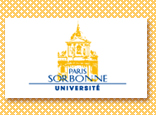|
| Accueil
> Centre
de recherche > Activités
de recherche > Colloques 2001 |
| |
Scholarly modes of electronic
publication:
conversational, discursive, formal |
| |
Willard
McCarty, King's College London
17 March
2001 - Sorbonne, Paris |
| |
- Conversational: Humanist
<www.kcl.ac.uk/humanities/cch/humanist/>
- Brief history, 1987-present
- Nature: seminar + piazza
- Uses: announcement, offer, call for participation,
query, discussion
- Purposes: socio-political (community & reputation
building), academic (field building), scholarly (research
& publication), intellectual (discovery)
- Ways and means: editorial persona, communal ethos
- Introductive/circumventive: the scholarly personal Web-site
(e.g. http://www.kcl.ac.uk/humanities/cch/wlm/)
- Nature: curriculum vitae + poster session
+ open source
- Uses: display interests, position, duties & responsibilities;
pre-/reprint giveaway
- Purposes: socio-political (establish bona fides),
academic (exert influence), scholarly-intellectual (circulate
ideas)
- Formal
- The Analytical Onomasticon
<http://www.kcl.ac.uk/humanities/cch/wlm/onomasticon-sampler/>
- Literary-critical overview: influence of the
poem; the problem of "unity" in the Metamorphoses
- Computational methodology: identification and
markup of names; modelling of literary phenomena
- Scholarship (vs enabling of scholarship): models
and their failures, e.g. a grammar of personification
- Form of publication: electronic, Web-based
- Problems and reasons: a history of misadventures
and reflections on it
- Glosses on the Psychomachia <ilex.cc.kcl.ac.uk/wlm/so/>
- Historical/philological overview: influence of
the poem; role of the glosses; current approach to glossing;
glosses as commentary (with paradoxical primacy)
- Computational methodology: image-mapping ->
image as commentary; problematic spatial relationship
of gloss to text
- Form of publication: electronic, Web-based
- Problems: all the expected ones....
|
| A descriptive grammar of personification |
| |
- Definition
Any rhetorical act that transgresses normal ontology by
investing an entity with a human imaginative component, whether
or not the result is anthropomorphic.
- Major groups
- Implicitly personified: purely fictitious creatures
that are ontologically unusual by nature.
- Explicitly personified, i.e. personifications proper,
ascribed to a varying mixture of 10 local factors, variously
influenced by one or more of 5 larger contexts.
|
- Local factors
- STRONG: sometimes occur alone
- Apostrophe
- Familial relationship
- Locution
- Mental activity
- WEAK: always in combination with one or more
other factors
- Attributed action
- Body-part
- Parallel to another entity.
- Possession
- Quality/role
- Self-reference (reflexive pronouns; possessive
adjective; other pronouns used reflexively)
|
- Larger contexts
- Onomastic: how the name is used, e.g. association
with an established person (e.g. sol and Phoebus),
frequent personification elsewhere (e.g. tellus/terra)
- Narrative: nature of the story being told
- Poetic-mythological: conventional associations
- Ontological: status --> ease of personification
- Personal: special individuals (e.g. Medea,
Orpheus) cause personifications
|
|
| |
|
| |
|
|
| Cette page est valide
HTML
4.01, CSS2
et accessible A. |
|
|



